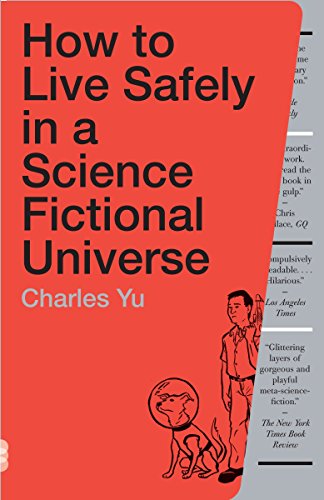
(post by Elizabeth Baker)
I chose How to Live Safely in a Science Fictional Universe by Charles Yu because it was in the Asian Science Fiction section at the Green Hand, and because there was a dog on the over. I’m interested in Asian SF, and I have a special interest in diasporic Asian fiction. How do we live in a new place? What stories get brought with migrants, and what gets left behind?
How to Live Safely in a Science Fictional Universe is a book about an Asian-American time machine repairman, Charles Yu who has spent almost a decade living out of his time machine, trapped outside of time and experiencing a mid-life crisis. In the background of his technician job, Yu is also searching for his father, who has been missing for years and who invented the first time machine. The conflict in the novel begins when Yu encounters his future self, who he shoots. This begins a time loop which Yu spends the rest of the novel trying to remove himself from.
This novel is Chinese science fiction, time travel, and very, very meta. It’s also very, very good! It is beautifully written and it has interesting time travel logic. The novel concerns itself greatly with metaphors, but it also uses sharp humor to off-set the high-brow logic. Ultimately, the story is about a father-son relationship with immigration, science fiction, and a mid-life crisis in the background. I highly recommend it! –Elizabeth Baker
Yu, Charles. How to Live Safely in a Science Fictional Universe. Random House, 2010.

Elizabeth– this sounds like a fun read, especially given its meta-ness. One question– can we call SF written by an American (Yu is American, born in the US, or at least raised here, I believe) with Chinese heritage “Chinese SF”? And if he grew up in the US, can we even call it diasporic? Is it Chinese-American SF? Is it American SF with Chinese references and inflections? Alternately, can someone born in the US to Russian-Jewish parents, say, and raised here, who then moves to China as a young person and lives there for decades be an author of “Chinese SF”? What are the parameters, or requirements, for a piece to be Chinese SF?